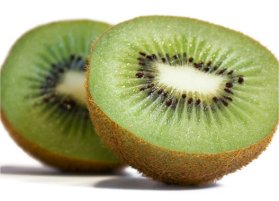For those who are struggling to sleep well, adding kiwi to your diet may have substantial benefits.
In a new study, subjects had their sleep quality and quantity measured. For the next four weeks, each subject consumed two kiwis approximately one hour before bed. During this time, the researchers found:
- People fell asleep more quickly. Sleep onset latency—the amount of time it takes to fall asleep after going to bed—decreased by 35.4%.
- People slept more soundly. Waking time after sleep onset—the amount of time spent in periods of wakefulness after initially falling asleep—fell 28.9%.
- Sleep quality improved. Scores on a standardized sleep quality questionnaire—where lower scores mean better sleep—decreased by 42.4%.
- Sleep efficiency—a measurement of the amount of time spent actually sleeping compared to the total amount of time spent in bed—increased by 5.41%.
- People slept more overall. Total sleep time among the volunteers increased by 13.4%.
The researchers suggested that the benefits may be due to the fact that kiwis contain the neurotransmitter serotonin, and concluded that those who are having trouble sleeping may benefit from kiwi consumption.
Conclusions
Unfortunately, this study was not a placebo-controlled study, so there is no way to really know if the kiwi was actually what was causing the improvements in sleep. It’s possible that confounding factors, such as changes in the weather, caused the improvements. Alternatively, it’s impossible to overlook the power of the placebo effect.
The suggestion that serotonin may have aided in sleep is interesting considering that melatonin is the main sleep hormone and serotonin can actually act as antagonist to melatonin. Thus, I am highly surprised that increased serotonin intake could lead to these changes.
Overall, I am not particularly impressed by this study and I feel that more tightly controlled research is needed before jumping to any conclusions.
References
1 Lin HH, et al. Effect of kiwifruit consumption on sleep quality in adults with sleep problems. Asia Pac J Clin Nutr. 2011;20(2):169-74.
